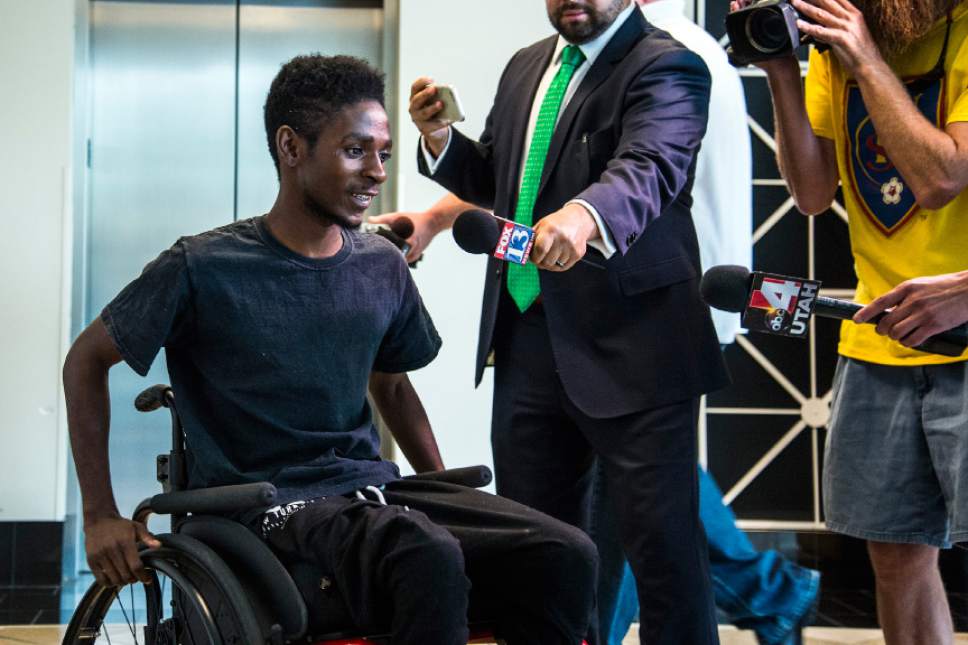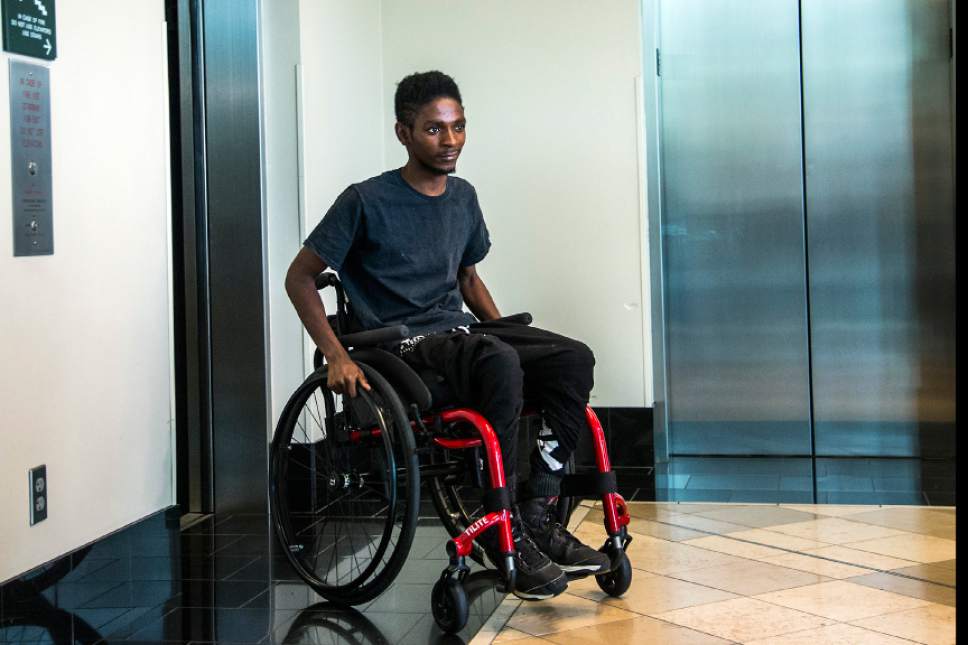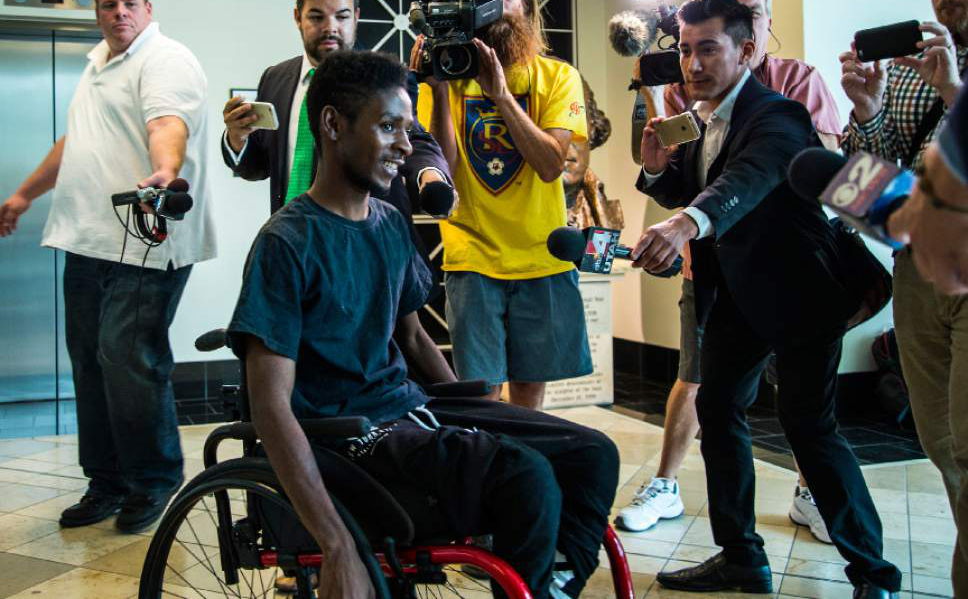This is an archived article that was published on sltrib.com in 2016, and information in the article may be outdated. It is provided only for personal research purposes and may not be reprinted.
Days after the Salt Lake County district attorney ruled that two police officers were justified in shooting now-18-year-old Abdullahi "Abdi" Mohamed, the Utah teen was in court for the first time to address the robbery and drug charges filed against him.
Mohamed was charged earlier this week in 3rd District Juvenile Court with aggravated robbery, a first-degree felony, and drug possession with intent to distribute, a second-degree felony. He is accused of assaulting another man after a dispute about a drug purchase.
Mohamed arrived Wednesday at the Salt Lake City courthouse in a wheelchair. He declined to comment to reporters before and after his brief court appearance.
In court, Mohamed spoke little as attorneys scheduled his preliminary hearing for Oct. 3. At that hearing, prosecutors will present evidence and Judge Julie Lund will decide whether there is enough evidence for the case to go to trial.
Mohamed's mother and stepfather came to the courthouse in support of the teen Wednesday, though no protesters who have backed the teenager since he was shot Feb. 27 were in attendance.
District Attorney Sim Gill said earlier this week that his office will seek to have the case moved to the adult system using Utah's Serious Youth Offender statute. The law allows prosecutors to push a case into adult court — and for youths to face the same consequences as if they were an adult — if the juvenile is 16 or 17 and has committed one of several designated felonies. (See box for more information.) Because Mohamed faces a charge of aggravated robbery and was 17 at the time of the alleged offenses, his case qualifies.
A warrant for Mohamed's arrest had been issued Monday after charges were filed, but the judge recalled the warrant Wednesday after attorneys said the teen is already in the juvenile justice system's custody for prior offenses, though he is living at his Salt Lake City home. He is under supervision for charges of alcohol possession, threat of assault and a noise-ordinance violation, according to juvenile court records.
The teen's attorney, Sam Pappas, said he did not have much information about Mohamed's medical prognosis Wednesday; he says he does not know whether his client will need to use a wheelchair permanently.
Mohamed is accused of assaulting a man who had asked to buy a marijuana cigarette from him for $1.10 near The Road Home shelter, 210 S. Rio Grande St. The teen told the man that he had only methamphetamine, according to charging papers, and insisted that the man turn over his money so Mohamed could find him a joint.
The man refused, he later told police, and instead offered Mohamed a metal rake handle that he had found in the trash. This made Mohamed "really mad," the man said, and the teen hit him with the rake handle. A second man wielding a metal pipe also joined in the assault, prosecutors allege.
Police Officers Kory Checketts and Jordan Winegar spotted this assault while investigating a report of a stolen cellphone, according to Gill. The two officers ordered the two to drop the weapons, and while the man with the pipe complied and fled, Mohamed did not obey their commands.
Gill said earlier this week that the officers yelled, "Put it down," "Drop it," "Police" multiple times before shots were fired. Mohamed was struck by four bullets, was in a medically induced coma and hospitalized for weeks.
The man who was assaulted had large welts and bruises on his arms, court papers say.
Mohamed told KUTV in May that a man had asked him for drugs and became angry when the teen's friends said they didn't have any. Mohamed grabbed a broomstick for protection, he said, after the man pulled out a knife and said, "I'm going to stab you."
Gill said there was no evidence indicating that the other man had a knife. Police say they found three "twists" of meth in Mohamed's pants, which medics had removed.
The Salt Lake Tribune does not generally identify juveniles charged with a crime, but Mohamed's family publicly identified him in the wake of the police shooting.
The shooting sparked an immediate outcry from people gathered near the shelter, who shouted and threw rocks and bottles at the police. The fervor continued in the ensuing months, with protests, demands for the release of body-cam footage and calls for better dialogue between police and the public.
Mohamed's family and the American Civil Liberties Union of Utah have asked that the footage be released, but Gill's office has denied the requests, citing an ongoing investigation. During a Monday news conference announcing that the officers were justified in firing their weapons, Gill said the body-cam video still would not be released because it has become evidence in Mohamed's criminal case.
The ACLU of Utah responded Wednesday, saying it was "shocked and dismayed" over the latest announcement that the video would not be released. The organization's legal director, John Mejia, said the public should be able to see the footage and "not just hear the government's selective version of the footage."
"The county has defended its lack of transparency in refusing to release the footage by asserting that it seeks to protect the impartiality and integrity of their investigation and prosecution of Abdi," Mejia said in a statement. "[Yet] the county has publicly asserted that Abdi was engaged in serious criminal wrongdoing and, at the same time, publicly cleared the involved officers of any wrongdoing. In making these announcements, the county gave an account of the still-withheld footage that was favorable to the officers, and disclosed other information that is also relevant to the prosecution."
Serious youth-offender law
Any 16- or 17-year-old who is charged with one of several designated felonies can have his or her case moved to the adult court system under Utah's Serious Youth Offender law.
Those charges include:
• Aggravated arson.
• Aggravated assault that leads to serious injury.
• Aggravated kidnapping.
• Aggravated burglary.
• Aggravated robbery*.
• Aggravated sexual assault.
• Felony discharge of a firearm.
• Attempted aggravated murder.
• Attempted murder.
• Any other felony offense that involves a dangerous weapon, if the youth has been previously convicted of an offense involving the use of a dangerous weapon.
The criminal case is filed in juvenile court, where prosecutors will present evidence of the alleged crime during a preliminary hearing. If a juvenile court judge finds there is enough evidence for the case to proceed, the defense can present evidence in an effort to persuade the judge to keep the case in the juvenile system. If the case is moved to the adult system, the youth faces the same potential penalties as if he or she were an adult.
*Offense with which Abdullahi "Abdi" Mohamed is charged
Source: Utah statutes







